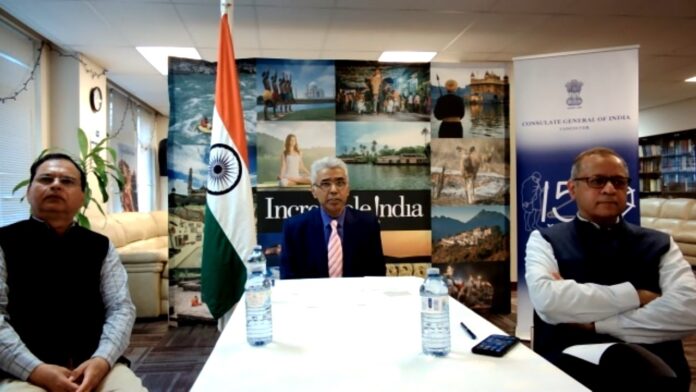ON September 30, a panel discussion on “Gandhi and his relevance today – Post-COVID’ was chaired by the new Indian Consul General in Vancouver, Manish Gupta, and hosted by Consul Manjeesh Grover.
The panelists were Arvind Thakore of Gandhi Foundation who sponsors Gandhi Day at Simon Fraser University; Dr Nemy Banthia, Professor of Engineering at the University of British Columbia and Scientific Director and CEO of Canada-India Research Center of Excellence, IC-IMPACTS; Kamal Sharma of Kamal Media Productions; and Dr. Arun Garg, Professor of Laboratory Medicine at the University of British Columbia and CEO of Canada India Network Society (CINS).
The video of the session is available at: https://www.facebook.com/cgivancouver/videos/3331553360258029/
Arun Garg on “Gandhi and Leadership”

Gandhi ji’s accomplishments are omnipotent and universal, his values and principles are a guiding light for humanity. These are summed up best in the words of Albert Einstein: “Generations to come will scarce believe that such a one as this, ever in flesh and blood, walked.”
Gandhiji said, “Where there is no truth there can be no true knowledge. That is why the word ‘chit’ or knowledge is associated with the name of God. And where there is true knowledge there is always bliss (‘ananda)’. Sorrow has no place.
It is integrative leadership – “fusion of best of East and best of West.” Its relevance is how we govern ourselves, how we live our lives, and how we treat each other. Canada India Network Society and LEADS Global have a collaborative project where domains of LEADS — L – for lead one’s self; E – for engaging others, A – for achieve results, D – for develop collaboration and S – for system sustainability — are linked to ‘Raj Yoga’ – codified by Rishi Patanjali, as the foundation of the house: ‘Bhakti,’ ‘Karma’ and ‘Jap Yog’ as posts holding the house, and ‘Gyan Yoga’ as the roof. This is fusion of the best of East and the best of West. The ‘Gyan Yog,’ 5th of ‘Yogs’ and it is S of LEADS – most relevant today for harmony, happiness and success.
Arvind Thakore: Gandhi and ‘Satyagraha’ and ‘Ahimsa’

As per Gandhi’s view, an individual can generate the irresistible power of ‘satyagraha’ only when he has become passion-free in thought, speech and action and able to rise above the opposing currents of love and hatred, repulsion and attachment.
The purpose of ‘satyagraha’ is to resolve the underlying source of conflict, no matter where it is, to a mutual peaceful understanding and cooperation.
It does not matter who the adversary is.
‘Satyagraha’ is not a method. It is an attitude, an inner condition of nonviolent love as it relates to humanity and to the rest of the living world.
Today, when divisive forces, fake news, selfish actions by individuals and politicians are tearing the fabric of our society, it is important to bring this message to the people.
Kamal Sharma – Gandhiji and Movies

Gandhi Ji was not only the biggest figure in Indian Independence Movement but was also the face of it to the rest of the world and this perhaps explains why he is the subject of books and stage plays. A documentary on Mohandas Karamchand Gandhi by A.K. Chettiar in 1953 was well received around the world. It prompted English director Mark Robson to make Nine Hours To Rama in 1963. However, after a special screening, the then Indian Prime Minister Jawaharlal Nehru banned the film’s release in India.
British director Sir Richard Attenborough’s film Gandhi (1982) swept the Academy Awards, BAFTA, the Golden Globe and National Awards as the world applauded the four principles of Gandhi Ji – Truth, Non-Violence, Peaceful Protest, and Welfare of All.
The incredible success prompted many more films on Gandhi Ji, like The Making Of Mahatma (1996), Hey Ram (2000), Maine Gandhi Ko Nahin Maara (2005), Lagey Raho Munna Bhai (2006), Gandhi My Father (2007), Welcome Back Gandhi (2012), Gandhigiri (2016), Gandhi To Hitler (2017) and the very recent The Gandhi Murder (2019). What an irony that Gandhi Ji never met any film stars and never showed any inclination or liking of films and yet his persona, teachings and philosophies have inspired and probably will keep inspiring many more films in future.
Nemy Banthia: Gandhi and Civil Society

Three of Gandhian teachings are far more relevant today than ever before.
‘Non-Violence’ teaches us to refrain from the intention of causing physical and psychological pain to any living being and consciously integrate compassion into every aspect of our daily life.
Today, we see injustices everywhere. Either it is in the form of George Floyd under the knee of a white police officer in Minneapolis, or screams of Joyce Echaq, a dying Indigenous woman being insulted by hospital staff in Joliette, Quebec. Let’s rise against these injustices (‘Satyagraha’).
Finally, we need to fight for ‘Social Equality.’ This includes Canada’s 2 million Indigenous habitants that live without clean water, education, sanitation and healthcare.
I personally believe that low-cost technologies will be the greatest equalizer in the future. Please visit www.ic-impacts.com to see how we are developing frugal technologies in water, health, energy and infrastructure to transform communities in Canada and India.











